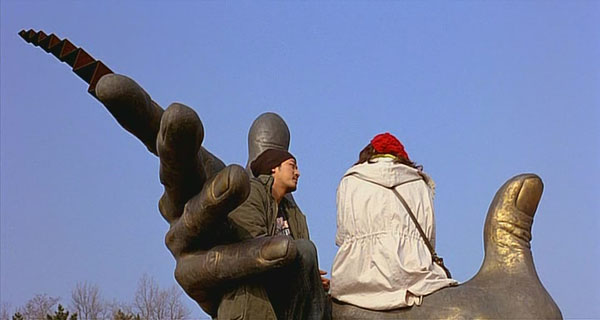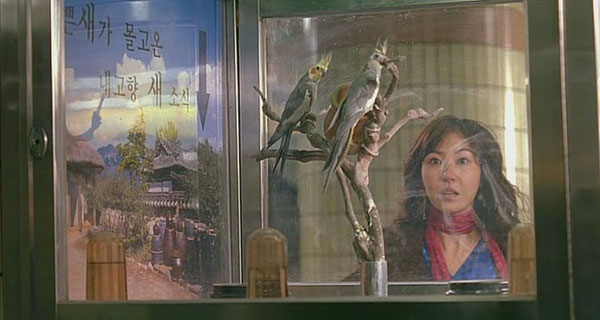“Sorry for always having the same boring face.”

Ji-woo is a guy with a bitchy, paranoid girlfriend who thinks he’s lost interest in her so she decides to get massive plastic surgery.

Months after her sudden disappearance he starts dating this new girl who is actually his old girl Seh-hee with her new face. She doesn’t know how to respond… if you’re super-jealous and your boyfriend is attracted to you in disguise, are you happy or angry?

It’s not working for them, so he disappears and gets a new face as well.

He never identifies himself, so she spends a year wondering if everyone she meets is him – finally chases down a guy who she’s sure is her man until he runs into traffic and gets killed.

She runs back to the plastic surgery place, bumping into herself from earlier in the movie. A weird ending. Seriously good movie though, moving and beautiful. Spiritually more in the vein of his 3-Iron with some of the outrageous craziness of Bad Guy, but none of the mad crappiness of that one.

M.Z. Seitz:
Mr. Kim flips between soapy melodrama and dry, self-aware comedy. The effect is thrilling and disorienting, like walking on a trampoline. … Time has been described as a comedy about the hollowness of relationships in a global consumerist culture, and it certainly is. The film’s three lead performances, by Mr. Ha as Ji-woo and by Ms. Seong and Ms. Park as the two incarnations of his lover, are fearlessly honest, so attuned to contemporary anxieties about sex, love and social status that the characters’ unhappiness is as squirm-inducing as the movie’s close-ups of sliced flesh. But while the film’s cultural context is of the moment, its depiction of romantic desperation is timeless. Many scenes end on the same uneasy note, a mix of cynical dissatisfaction and desperate, almost childlike neediness.
M. D’Angelo:
That both Seh/See-hee and Ji-woo actually talk—there’s more dialogue here than in all of Kim’s previous films put together—is something of a mixed blessing. On the one hand, the mute shtick, introduced in The Isle and honed in Bad Guy, 3-iron, and Spring, Summer, Fall, Winter . . . and Spring, was getting decidedly stale. On the other hand, ordinary human conversation is clearly not Kim’s forte. Seh-hee’s initial fit of jealousy, in particular, is so cartoonishly strident that it sets entirely the wrong tone, giving the impression of a poor shmuck tormented by a vindictive harpy.
Those aware that cosmetic surgery is endemic in South Korea are liable to jump to the conclusion that Kim intends Time as some sort of clumsy exposé. But he didn’t choose that title lightly. Save for a clinical opening-credits sequence, the film’s incisions are exclusively psychosexual. Duration’s corrosive effect on long-term relationships has rarely been depicted with such bracing candor. Simply put, Time is about the eternal war between infatuation and familiarity, and our irreconcilable need to find both in the same person. In other words, it’s a parable about the root of human unhappiness.